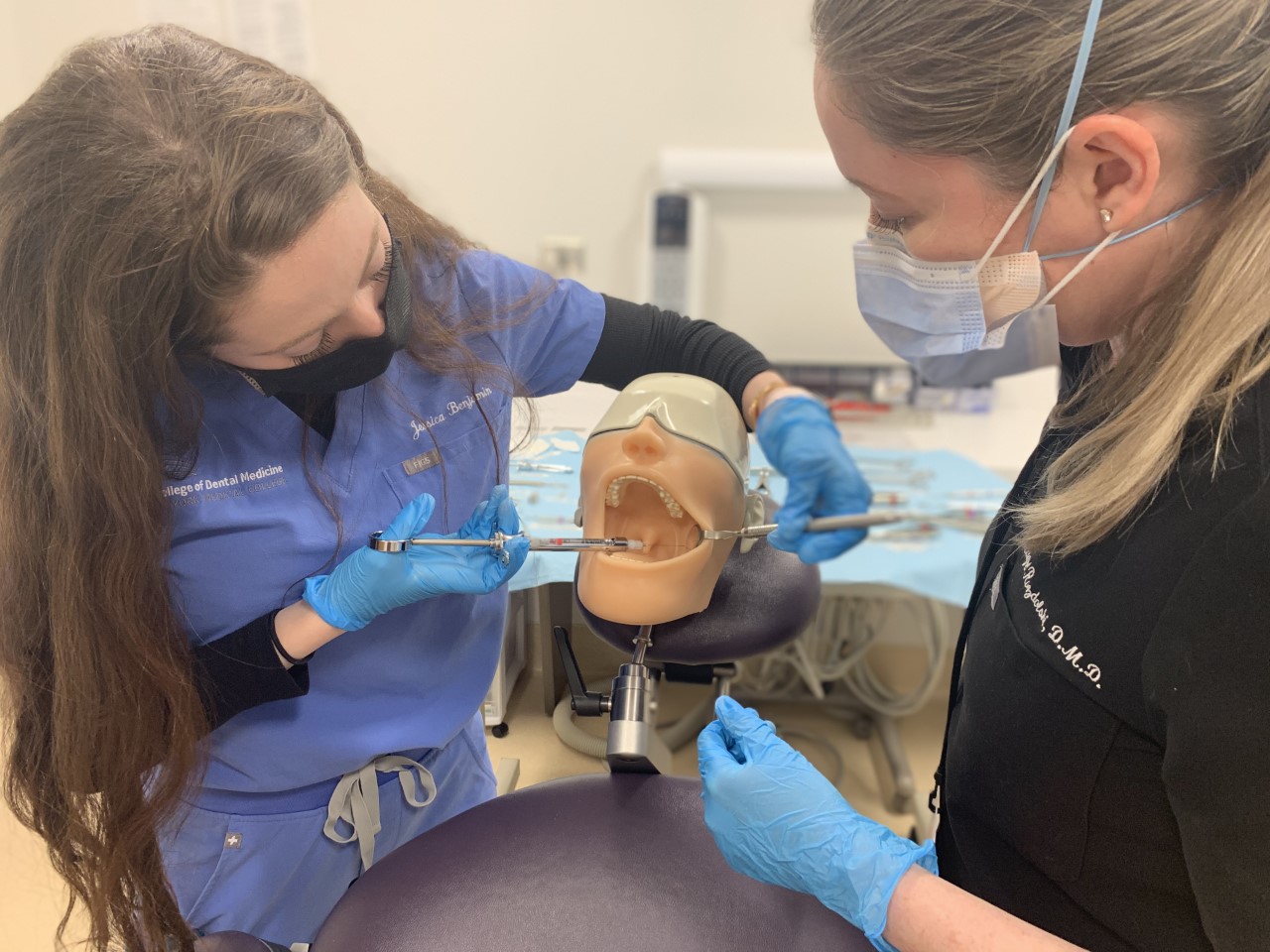‘Name That Injection’: TCDM D2 Students Participate in Innovative Educational Experience
Game Show Style Active Learning Session Takes Real-life Cases ‘Off the Page’ and Fosters Intraprofessional Collaboration

“A 40-year-old female complains of a ‘bump on my tongue.’ She was not aware of this until recently and has no history of trauma to her tongue. Her medical history is negative. She is worried about cancer and requests that you, her oral surgeon, remove this bump with local anesthesia.” While you may not know which nerves need to be anesthetized to remove the described lesion, second year dental students at the Touro College of Dental Medicine (TCDM) certainly do after having participated in the college’s first annual “Tournament of Local Anesthesia Champions.”
An innovative educational experience conceived by Howard Israel, D.D.S., Clinical Professor of Dental Medicine, and Raquel Rozdolski, D.M.D., Clinical Assistant Professor of Dental Medicine, the game show style assessment was developed for D2s as part of TCDM’s Pain and Anxiety Control course—a cornerstone in the education of second year dental students as they prepare to have their first ever patient care experiences this June in their D3 year. With the didactic portion of this year’s course taking place online via Zoom on account of the COVID-19 pandemic, the course directors sought to truly engage students one-on-one. By taking the material a step further, the unique learning session brought the patient “off the page,” effectively providing the class of D2s with a simulated clinical experience.
“Having provided students with foundational knowledge of anatomy, physiology, nerve function, and pharmacology through standard lectures for the first half of the course, we took a moment to reevaluate our approach, asking ourselves, ‘what is lacking from these sessions?’” said Dr. Israel. “The goal of this course is to get students ready for patient care, and so we decided to try a new tactic to help them put all of the concepts together.”
Randomly divided into breakout sessions, all 114 members of the Class of 2023 were presented with 15 real-life clinical scenarios, each requiring the need to achieve pain control. With eight minutes on the clock per case, the D2s were then tasked with working together in their individual teams to answer a series of situational questions—ranging from “what local anesthetic technique will achieve pain control?” to “which local anesthetic drug will you choose and why?”—before being asked to rejoin the main session to present and discuss their answers with peers and faculty.
While the “Tournament of Local Anesthesia Champions” was designed to challenge students and put their knowledge to the test, Dr. Israel and Dr. Rozdolski made the firm decision in holding this session to not assign students a grade based on the “correctness” of their answers. In a move seldom seen in higher education, both faculty members were determined to have students focus their full attention on learning and truly understanding the material rather than be concerned about achieving an “A.”
“As this course is the D2s’ first introduction to clinical-based cases, we wanted to ensure that we encouraged an open dialogue between all parties to go over the reasons why you would choose a local anesthetic, or why you would choose a different injection,” said Dr. Rozdolski. “We didn’t want students to feel penalized for giving a wrong answer, rather we wanted to gauge and strengthen their comprehension of the material without the pressure of receiving a grade.”
“All too often, students seem to be so focused on their grades that this gets in the way of their education,” added Dr. Israel. “Getting the grade is important, but learning is the key. We wanted to create an environment where the students were focused solely on understanding the material and thinking critically about how they would approach each case as a practitioner.”
Fun and entertaining while reinforcing critical concepts, the “Tournament of Local Anesthesia Champions” fostered an active learning environment that is sorely lacking in traditional dental education settings. By having the opportunity to exchange ideas with experienced dental professionals and their classmates, TCDM’s second year students gained not only valuable insight into how different courses of treatment can produce similar outcomes but also the vital importance of intraprofessional collaboration and communication.
“As students entering the healthcare field, it’s important for us to challenge what we initially think is right and listen to the input of our colleagues,” said D2 Marc Generowicz. “One memorable moment was when my peers challenged an answer I gave to one of the questions. This led to a dialogue between myself and my classmates, creating a meaningful learning experience because the whole class was involved in the conversation.”
With the second half of the spring semester in full swing, the members of the Class of 2023 are excited to finally have the chance to apply their well-honed skills and knowledge as they enter TCDM’s simulation laboratory to practice giving injections on anatomically correct manikins. While this year’s tournament was held virtually, both Dr. Israel and Dr. Rozdolski are greatly looking forward to the possibility of holding next year’s in person.
The COVID-19 pandemic may have changed the way in which students are receiving their education, but what has not changed is the unwavering commitment the TCDM faculty hold for educating the next generation of outstanding dental professionals. Whether in person or via Zoom, they have continuously gone the extra mile, providing students with the same quality teaching and ensuring they have the knowledge and critical thinking skills needed to make an impact in the lives of their future patients.
“Dr. Rozdolski and Dr. Israel, as well as the other TCDM faculty, emphasize the importance of ‘taking ownership’ of our studies, as these are skills that will help us become the professionals we hope to be,” shared Marc. “Participating in active learning sessions like the Local Anesthesia Competition gives us the ability to make the content ‘our own’ and thereby practice safe and effective care.”

